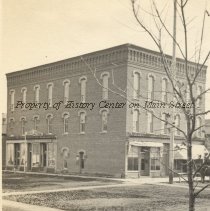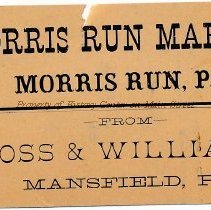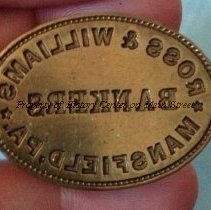Person Record
Metadata
Name |
Ross, Andrew J. |
Othernames |
A. J. Ross |
Genealogy ID |
87204 |
Born |
23 FEB 1827 |
Birthplace |
Pike, Bradford PA |
Deceased |
25 AUG 1875 |
Deceased where |
Mansfield, Tioga PA |
Cemetery |
Oakwood Cemetery |
Occupation |
Timber, Banker |
Titles & honors |
Burgess of Mansfield 1862 Co-Founder Ross & WIlliams Bank |
Father |
Isaac Ross |
Spouse |
Sarah McKune |
Children |
Charles S. Ross Edward H. Ross |
Reference |
Obit 1897 |
Notes |
Andrew J. Ross was born in Pike township, Bradford county, Pennsylvania, February 23, 1827. His father , Isaac Ross, was an early settler of Bradford county, and also a contractor on the North Branch canal, where Andrew J. was employed as a foreman. He afterwards clerked in a store at Stanton, Pennsylvania, and in 1854 located in Wellsboro, Tioga county. A year later he removed to Mansfield , and in partnership with the late Philip Williams, under the firm name of Ross & Williams, engaged in merchandising. In 1860 the firm added lumbering to their business and in 1865 sold out the store, but continued their lumber operations, and also opened a loan office. On May 24, 1872, they established the banking house of Ross & Williams, of which Mr. Ross continued as senior partner until his death, August 18, 1875. On April 22, 1856, he married Sarah McKune, a daughter of James McKune, to which union were born two children, Charles S. and Edward H. Mrs. Ross died on July 9, 1882, aged fifty-two years. During the thirty years of his residence in Mansfield , Mr. Ross was prominent both as a business man and a citizen . He took a deep interest in the building up of the borough, and gave a cordial and earnest support to every enterprise having that end in view. He was a warm friend of the Mansfield Classical Seminary and its successor, The State Normal School, during the years it was beset with difficulties and vicissitudes and served on the board of trustees and as treasurer of the institution for a number of years. In politics he was a Republican , and in religion , a member of the Protestant Episcopal church. (1897 HIstory) ROSS, Andrew J. - Death of Andrew J. Ross - This event, which was in no wise unexpected, occurred on Sunday afternoon. For weeks he had been confined to his bed and had received from his fond and faithful wife the most watchful and devoted care as well as the untiring efforts of the best medical skill. But the last had been pronounced. The breaking of earthly ties, which sooner or later will come to all, came to him. And he is dead. And in his death this community has lost one of its best citizens, his surviving partner in his business has lost one whose place cannot easily be filled, his wife a model husband, his two boys an affectionate father, his aged father a dutiful son, his brothers and sisters a brother of whom they could speak without reproach. His complaint, the seeds of which had been planted months ago, was chronic disease of the liver, as was attested by a post mortem examination on Monday afternoon under direction of Dr. May, of Corning. His attending physicians, Drs. Ross and Elliott, were fully satisfied of this before his death, but the result of the examination proved it to be more aggravated than was thought. Mr. Ross was the senior partner in the banking house of Ross & Williams, of this place. As a strict accountant and correct business man he had few equals. He was devoted to his business, and through his untiring industry had in but a few years comparatively, amassed a handsome competency, which, alas! he could not live to enjoy. He was decidedly unostentatious, and not a few were his quiet deeds of benevolence. One one occasion - it was a bitter cold day in winter - a little boy, pinched up and shivering, his bare, blue hands clutching the pittance, went into the bank and ordered a quarter ton of coal. Mr. Ross quickly retired, and in a few moments returned and placed upon the lad's hands a nice warm pair of mittens. That boy lives to bless his memory. He has gone in the prime of his life and usefulness, being but about forty-eight years of age. We hope to give a more extended notice of his career, written by one who is more intimately conversant with the subject. The funeral services took place yesterday morning at eleven o'clock, and were conducted by Rev. Thos. H. Cullen, of the Episcopal church, Tioga. The attendance was very large, our citizens turning out generally. We also notice quite a number from abroad, among whom were F.E. Smith and D.L. Aiken, Esqs., of Tioga; L.H. Shattuck, Esq., of Blossburg; A.M. Spencer, Esq., of Canoe Camp; Miss Fannie Dyer and sisters, of Covington; Wm. Hearing, Esq., and Major Anderson, of Morris Run. Prof. Allen, Prof. Verrill, Capt. A.M. Pitts, J.S. Murdough, F.E. Smith and Mart King served as pall bearers. The long cortege slowly wended its way from the pleasant residence on Main street to the quiet cemetery on the hillside, where the beautiful casket containing the remains were deposited in the vault. Rest in peace! Mansfield Advertiser, 1 September 1875, p.3, col.2 Mansfield Advertiser, 22 September 1875, p.2, col.2 & 3 In Memoriam - Andrew J. Ross [SRGP 87204] When a good man dies the world sustains a loss. The extent of that loss is measured by the boundary of the circle in which he moved. Every man, however humble, fills some measure of space in every community, and helps to retard or advance its progress, and to add to, or diminish its wealth. He may be simply a dead weight, borne along by the passing, busy, working crowd, a drag and hindrance to society, or he may be a positive power, known and felt in every department of business, or society. A score of men can be found in almost any community, whose positive power, it susceptible of measurement, would be found to be zero. So when men die, outside the immediate circle of relatives, the loss sustained is proportioned to the amount of positive power they have exerted, either for good or ill. When on the 20th ult., it was announced that Andrew J. Ross was dead, our community, for the time being, was paralyzed. the general feeling that prevailed was, that we could not have it thus - that there must be some mistake. Only one short month had elapsed since we met him upon the street, bearing with and about him the same genial countenance and kindly and courteous manners for which he had so long been known. He was seemingly in the full vigor of manhood, robust and healthy - though complaining of what seemed to be a slight indisposition, that it was thought a few weeks of relaxation from business would relieve, But the stern, sad fact was fully realized, when we stood amid that thronging crowd of neighbors and friends from this and the surrounding towns that gathered to pay their last respects to the sleeping dead. In the death of Mr. Ross this community has sustained a loss of no ordinary value. Every business interest, for miles in extent, must feel it. Twenty consecutive years of active life, spent in a community like this, beginning with a very limited capital and ending in the accumulation of an honorable wealth, gained by frugality and close attention to business, could not fail to identify such a life with almost every interest. Among the distinguishing traits of character that gave to Mr. Ross a manifest power, was his integrity. No Man, under any circumstances, ever doubted his word, This reliability won for him a comparatively large and increasing business, in every vocation he followed. He was a close and careful observer and reader of men, forming opinions, not hastily, but after mature reflection. Opinions thus formed were not easily changed. He was not only firm and resolute, but just in his dealings with all men. Knowing the rules and usages of business, he followed them undeviatingly. By some he was thought to be too exacting and rigid. But is must be borne in mind that a business like banking, to be in itself safe and reliable, gaining and keeping the confidence of business men, must be governed and controlled by an undeviating law, inflexible in its operations. The banker deals not alone with his own, but other people's capital. It therefore necessarily deprives him of the privileges of taking risks and extending time and favors as his own individual feelings might oftimes dictate.But there are hundreds of men who can bear ample testimony to the benefits and favors extended to them through the kindness and courtesy of Mr. Ross. The wealth he gained in this community has been invested among us, and by it men are enabled to do business with greater care and facility. What would have been the condition of Mansfield today, had not the banking house of Ross & Williams, or a similar one, been established among us? To the prudent, economical business man, this institution has been not only a help, but a necessity. But of the improvident idlers and non-producers, or unskilled speculators, who only seek for loans at bank to enable them to put still further off the day when debts must be paid, it has not met their expectations, and they often denounce the men who aided them. Such men labor under the impression that borrowing money at bank actually pays debts. Mr. Ross was a believer in the doctrine that the best way to assist others was to aid them to help themselves. To this end he frequently opened a way for those who were seeking for aid, and thus enabled them to feel far more independent than in the reception of gifts. A proposition was submitted one day last winter, as a few of us were seated in his office, to raise a fund to aid the poor in our community who were unable to obtain work. His practical mind at once suggested that a better plan would be to find work for them to do, and this was adopted. Being an industrious, frugal, producing man, it was always painful to him to see the ................ and idlers in community, who not only do not cause two blades of grass to grow where but one grew before, but actually destroy the one blade they find growing. Mr. Ross was far above the average of those with whom he moved. His fine manly form was endowed with an intellect of no ordinary mold. Few, if any, among us possessed a clearer, or more sound mind. His opinions were sought after because of their value. As a business man he had few equals. He gave his whole mind and attention to the business in which he was engaged, and this close, unremitting attention was the probable cause of his early death. Few among us exerted a wider influence. His quiet, unobtrusive, yet forcible manner of doing and saying things, gave to him an unseen yet manifest power. He was reticent to the worked, yet free and communicative with friends. The growth and prosperity of our town was a matter of deep interest to him. During the past six or eight years he manifested not a little interest in the erection of the Episcopal church, of which he was for years a vestryman, and at a later period a communicant. Mr. Ross was born in Pike, Bradford County, PA, Feb. 23, 1827. His father for years was a contractor on the North Branch canal, living along the line of this work in the counties of Bradford and Wyoming. His early education was such as the common schools of those counties and times afforded. Later in life he spent some time at the old Harford academy in Susquehanna county. Among his first and earliest employments from home was that of clerk in a store at Carbondale at a salary of fifty dollars a year, which served to minister to his needs, it not to his wants. His success as a clerk undoubtedly determined his choice of vocation. Soon after, he was engaged as a clerk with his brother Edward, in Wellsboro, where he remained until he entered into a partnership in the iron business at Tunkhannock, which was afterwards continued in Falls, Wyoming county. From that place, it we are rightly informed, he came to this, and engaged in the mercantile business, which he continued alone for three years, when the partnership, so long and favorably known among us as Ross & Williams, was formed. This partnership brought together two men, unalike in many respects, yet combining a rare and unusual as well as varied talent for business. From the ordinary mercantile pursuits, the business was extended so as to embrace lumbering as well as cattle and produce buying. A large portion of the mining district was supplied with hay, grain and cattle by this firm. A few years later the mercantile department of the business was dropped, and money loaning substituted. This was continued until three years since, when a regular banking house was established, in the fine building erected for that and other purposes so recently. this partnership was rather a remarkable one. For nearly twenty years of close and unremitting contact in their varied business, one doing the outdoor and purchasing business and the other the office and detail work of bookkeeping, money loaning and paying, and yet not an angry or harsh word passed between them. The deference that each paid to the other's view and opinions, allowed them to do business together for nearly a fifth of a century without jarrings or discord, or even the ordinary friction incident to a business so extended. Mr. Ross, upon his dying bed, made mention of this remarkable harmony and undisturbed friendship. On one can feel this loss, outside the immediate relatives, more than Mr. Williams. It is the greatest of his life, and he yet daily carries with him this sad burden of grief. Mr. Ross has left a most estimable woman and wife, and two promising sons aged about twenty and ten, to mourn his loss. Mansfield Advertiser, 4 October 1876, p.3, col.1 & 2 -- The Ross monument, recently erected in our cemetery by Barnes, Blanding & Co., of Binghamton, NY, is the largest and most costly in Northern Pennsylvania or Southern New York. It was made in Quincy, Mass., of the celebrated granite of that name, and is twenty-five feet in height. The base is five feet six inches square, and weighs upwards of seven tons. The tablets are exquisitely polished. The total weight is twenty tons. |
Places of residence |
Mansfield, Tioga PA |



